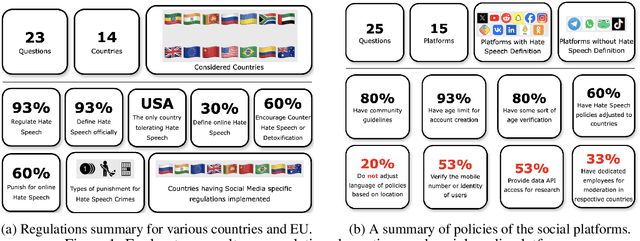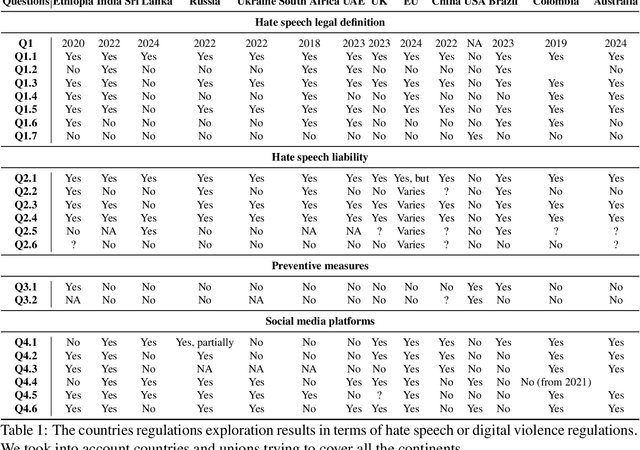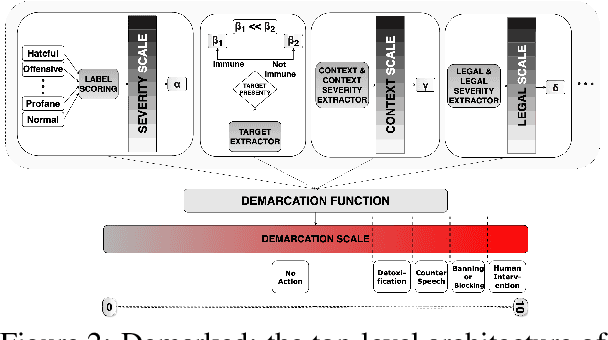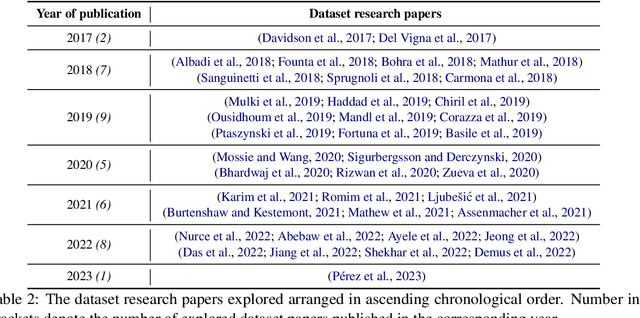Martin Semmann
FASCIST-O-METER: Classifier for Neo-fascist Discourse Online
Jun 12, 2025Abstract:Neo-fascism is a political and societal ideology that has been having remarkable growth in the last decade in the United States of America (USA), as well as in other Western societies. It poses a grave danger to democracy and the minorities it targets, and it requires active actions against it to avoid escalation. This work presents the first-of-its-kind neo-fascist coding scheme for digital discourse in the USA societal context, overseen by political science researchers. Our work bridges the gap between Natural Language Processing (NLP) and political science against this phenomena. Furthermore, to test the coding scheme, we collect a tremendous amount of activity on the internet from notable neo-fascist groups (the forums of Iron March and Stormfront.org), and the guidelines are applied to a subset of the collected posts. Through crowdsourcing, we annotate a total of a thousand posts that are labeled as neo-fascist or non-neo-fascist. With this labeled data set, we fine-tune and test both Small Language Models (SLMs) and Large Language Models (LLMs), obtaining the very first classification models for neo-fascist discourse. We find that the prevalence of neo-fascist rhetoric in this kind of forum is ever-present, making them a good target for future research. The societal context is a key consideration for neo-fascist speech when conducting NLP research. Finally, the work against this kind of political movement must be pressed upon and continued for the well-being of a democratic society. Disclaimer: This study focuses on detecting neo-fascist content in text, similar to other hate speech analyses, without labeling individuals or organizations.
POLAR: A Benchmark for Multilingual, Multicultural, and Multi-Event Online Polarization
May 27, 2025Abstract:Online polarization poses a growing challenge for democratic discourse, yet most computational social science research remains monolingual, culturally narrow, or event-specific. We introduce POLAR, a multilingual, multicultural, and multievent dataset with over 23k instances in seven languages from diverse online platforms and real-world events. Polarization is annotated along three axes: presence, type, and manifestation, using a variety of annotation platforms adapted to each cultural context. We conduct two main experiments: (1) we fine-tune six multilingual pretrained language models in both monolingual and cross-lingual setups; and (2) we evaluate a range of open and closed large language models (LLMs) in few-shot and zero-shot scenarios. Results show that while most models perform well on binary polarization detection, they achieve substantially lower scores when predicting polarization types and manifestations. These findings highlight the complex, highly contextual nature of polarization and the need for robust, adaptable approaches in NLP and computational social science. All resources will be released to support further research and effective mitigation of digital polarization globally.
CollEX -- A Multimodal Agentic RAG System Enabling Interactive Exploration of Scientific Collections
Apr 10, 2025Abstract:In this paper, we introduce CollEx, an innovative multimodal agentic Retrieval-Augmented Generation (RAG) system designed to enhance interactive exploration of extensive scientific collections. Given the overwhelming volume and inherent complexity of scientific collections, conventional search systems often lack necessary intuitiveness and interactivity, presenting substantial barriers for learners, educators, and researchers. CollEx addresses these limitations by employing state-of-the-art Large Vision-Language Models (LVLMs) as multimodal agents accessible through an intuitive chat interface. By abstracting complex interactions via specialized agents equipped with advanced tools, CollEx facilitates curiosity-driven exploration, significantly simplifying access to diverse scientific collections and records therein. Our system integrates textual and visual modalities, supporting educational scenarios that are helpful for teachers, pupils, students, and researchers by fostering independent exploration as well as scientific excitement and curiosity. Furthermore, CollEx serves the research community by discovering interdisciplinary connections and complementing visual data. We illustrate the effectiveness of our system through a proof-of-concept application containing over 64,000 unique records across 32 collections from a local scientific collection from a public university.
Demarked: A Strategy for Enhanced Abusive Speech Moderation through Counterspeech, Detoxification, and Message Management
Jun 27, 2024



Abstract:Despite regulations imposed by nations and social media platforms, such as recent EU regulations targeting digital violence, abusive content persists as a significant challenge. Existing approaches primarily rely on binary solutions, such as outright blocking or banning, yet fail to address the complex nature of abusive speech. In this work, we propose a more comprehensive approach called Demarcation scoring abusive speech based on four aspect -- (i) severity scale; (ii) presence of a target; (iii) context scale; (iv) legal scale -- and suggesting more options of actions like detoxification, counter speech generation, blocking, or, as a final measure, human intervention. Through a thorough analysis of abusive speech regulations across diverse jurisdictions, platforms, and research papers we highlight the gap in preventing measures and advocate for tailored proactive steps to combat its multifaceted manifestations. Our work aims to inform future strategies for effectively addressing abusive speech online.
 Add to Chrome
Add to Chrome Add to Firefox
Add to Firefox Add to Edge
Add to Edge